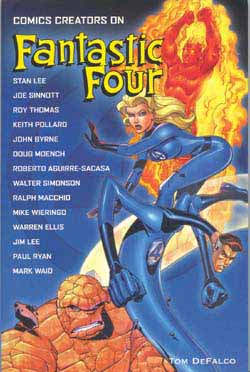 Â
Â
By Tom DeFalco (Titan Books)
ISBN: 1-84576-053-0
There’s something of a misunderstanding inherent in this line of products that give the inside skinny on the process of creating some of most popular comic characters. Many people I’ve spoken to will eventually admit that a big factor in these books’ appeal is the slim possibility that the reader might stumble onto The Secret.
I think it’s fair to suggest that most people reading comics harbour strong desires to actually work in comics, and after twenty-five years teaching comics skills to a variety of ages, I can reveal the answer to those hungry urges is work hard to improve, persist — and be very, very lucky.
So why buy this book? If it can’t teach you how to write like Warren Ellis or Mark Waid, or draw like Jack Kirby or Jim Lee what use is it? If it doesn’t teach you a secret hand shake or how to get a submissions editor to answer your letter, what’s the point?
The point is certainly knowledge. But that answered question is not “howâ€, it’s “whyâ€.
Why has a certainly unoriginal concept lasted so long and generated so much good work from so varied a band of creators as Stan Lee, Jack Kirby, Joe Sinnott, Roy Thomas, Keith Pollard, John Byrne, Doug Moench, Roberto Aguirre-Sacasa, Walter Simonson, Ralph Macchio, Mike Wieringo, Warren Ellis, Jim Lee, Paul Ryan and Mark Waid among so many others?
Why devote so much time and energy and zeal to something so ultimately transient? That is a question all would-be creators should be asking themselves.
As a jolly, nostalgic cultural coffee-morning reminiscence this book is a welcome slice of approachable documentary. We comic fans will read, and nod or demur at someone’s opinion, and ponder sagely at the minutiae revealed by this stellar list of comic makers.
I know I did.
© 2005 Tom DeFaco. All Rights Reserved.

The quest to find The Secret is seductive. So seductive, in fact, that many people on the quest forget to actually do any work. There comes a time when a would be creator has to set aside the theory and act. It’s a simple lesson to learn, yet one so hard to accept.
Truer word was never spoken.
There’s no substitute for discipline and will power, although sometimes working with somebody you can chivvy up each other.
You still have to be prepared to graft though.